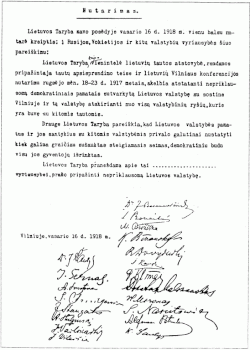Pranas Dovydaitis
Pranas Dovydaitis (born December 2, 1886 in Runkiai ( Marijampolė district ), † November 4, 1942 in Yekaterinburg , Soviet Union ) was a Lithuanian university professor , politician and prime minister .
biography
Studies and professional career
After school education in Marijampolė , he began in 1908 to study law at the Lomonosov University in Moscow , which he graduated in 1912 with the state examination. He also completed a degree in philosophy of history . As a student he was a journalist for newspapers and journals such as Aušrinė ("The Dawn").
After graduating he became in 1913 editor in Vilnius appearing daily newspaper Viltis ( "The Hope"), where it soon, however, conflict with the editor in chief Antanas Smetona came. The reason for this was the different political views, which were partly shaped by Catholicism , partly by nationalism . Nevertheless, he remained editor of Viltis at the beginning of the First World War , but in 1915 he switched to the newspaper Saulė ("The Sun") as an editor . In 1916 he became a teacher and director of the Kaunas grammar school . He also taught at Saulės High School in Kaunas .
Independence and Prime Minister 1919

From September 18 to 22, 1917 he was a participant in the National Conference of Vilnius , at which the process of establishing a Lithuanian state independent of the Russian Empire, Poland and the German Empire began. The National Conference elected him to the 20-member Lithuanian State Council ( Lietuvos Taryba ), where he represented the then Christian Lithuanian Trade Union Confederation ( Lietuvos Krikščionių Darbininkų Profesinės Sąjunga ). On February 16, 1918, the State Council proclaimed the independence of Lithuania, which became a reality with the end of the First World War in November 1918.
On March 12, 1919, he was appointed Prime Minister to succeed Mykolas Sleževičius . He resigned this office to Sleževičius a month later on April 12, 1919. His reign was thus the shortest term in the First Republic of Lithuania. In September 1922 he was honored by issuing a postage stamp .
University professor
Subsequently, he was again high school teacher from Kaunas, as well as a lecturer in philosophy of history at the University of Kaunas ( Aukštieji kursai ). After founding the Vytautas Magnus University Kaunas in 1922, he became a professor of philosophy . During his teaching activity, which lasted until 1940, he was also secretary of the senate and secretary of the theological and philosophical faculty . In 1935 he was awarded an honorary doctorate in philosophy. After the occupation of Lithuania by the Red Army , he retired on July 14, 1940 . During his activity as a professor, he was also the editor and publisher of philosophical-religious journals such as Logos and Soter, as well as the author of nearly forty other specialist journals. Between 1931 and 1940 he was deputy editor-in-chief of the Lithuanian Encyclopedia ( Lietuviškoji enciklopedija ).
Other
1925–1927 he headed the Catholic youth organization Ateitininkai .
In 1941 he was arrested by the Soviet occupying forces and, after a few months in prison, executed in an internment camp .
On May 7, 2000, he was recognized as a martyr by the Catholic Church .
Web links
- Biography on the Seimas homepage
- Biography on the government homepage
- Biography on the Prime Ministers homepage
- Biography on the website of the National Museum of Lithuania
- Biographical information in rulers.org
- Governments 1918-1940
Individual evidence
- ↑ 2 Auksinai stamp from 1922 ( page no longer available , search in web archives ) Info: The link was automatically marked as defective. Please check the link according to the instructions and then remove this notice.
| predecessor | Office | successor |
|---|---|---|
| Mykolas Sleževičius |
Prime Minister of Lithuania March 12, 1919 - March 12, 1920 |
Mykolas Sleževičius |
| personal data | |
|---|---|
| SURNAME | Dovydaitis, pranas |
| BRIEF DESCRIPTION | Lithuanian politician and prime minister |
| DATE OF BIRTH | December 2, 1886 |
| PLACE OF BIRTH | Runkiai , Marijampolė District , Lithuania |
| DATE OF DEATH | November 4, 1942 |
| Place of death | Yekaterinburg , Soviet Union |

